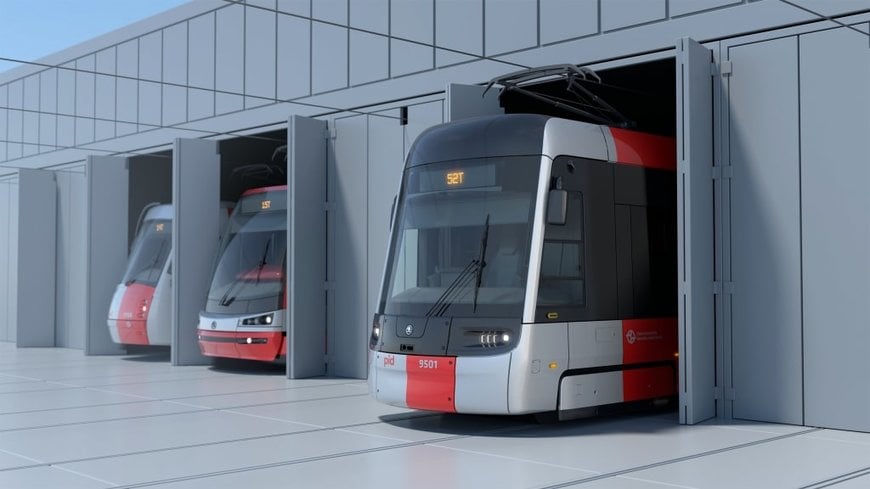railway-international.com
12
'24
Written on Modified on
Škoda: New trams for Prague revealed
The capital of the Czech Republic can look forward to up to 200 modern, 100% low-floor Škoda ForCity Plus Praha 52T trams.

The Prague Public Transit Company (DPP) has signed an eight-year contract with the winner of the public tender, Škoda Group, for the purchase of 40 trams and an option to deliver up to 160 more. The total value of the contract is nearly CZK 16.602 milliard, and it is one of the largest investments in new trams in the modern history of DPP. The first 20 new trams are expected to arrive in Prague in December 2025, and another 20 vehicles a year later, by the end of December 2026.
The Škoda ForCity Plus Praha 52T is a one-way, five-part, 100% low-floor tram without a single step in the entire passenger compartment, including the space above the bogies, in a modern design created by a team of designers from Škoda Group led by Tomáš Chludil. It is 32 metres long, equipped with full-carriage green air conditioning with ecological refrigerant, an anti-collision system, automatic passenger counting, energy-saving LED interior and exterior lighting, and 70 padded seats, of which 44 are forward-facing and 26 are rearward-facing. Compared to the previous 15T trams, the capacity of the new vehicles will increase by 33 passengers, or almost 16%. Passengers will appreciate the new information system with six large screens across the entire width of the aisle and more intuitive operation of the door opening buttons and signalling to the driver. That’s a short description of the new tram that will hit the streets of Prague for the first time in 2025.
Prague, especially its historic centre, is typical for its narrow streets with sharp curves and steep gradients, significant height differences in the tram network, but also long and relatively straight routes. The development of the new tram for Prague considered all these facts as well as the technical requirements of the DPP resulting from the previous operating experience. The design of the new tram combines a multi-link vehicle with two pivoting bogies under the outermost links and two partly pivoting bogies under the inner chassis links. This combination allowed for a much more accessible, airy saloon for passengers with short, wider, and spacious joints, free of any steps or other barriers. It also ensures adaptability to any track profile and promises a smooth, comfortable, and quiet ride, as well as reduced wear and tear on wheels and tracks. This solution will have an impact on the longer service life of the vehicles, assuming, for example, up to 50% more-wheel mileage than the 15T trams, and ultimately lower maintenance costs for the bogies and its most expensive components.
Anti-collision system – accident prevention
Due to increasing demands on safety, each new tram will be equipped with a Škoda anti-collision system to reduce the likelihood of collisions in traffic. To do this, it uses a combination of dual LiDAR and HD-camera technology and precise localisation using off-line recorded HD maps and odometry. This set-up allows the system to create a virtual driving tunnel in which the tram can detect obstacles within 10 cm, provide early warnings, minimise false positive warnings, and activate the emergency brake in time. The anti-collision system will thus help prevent major accidents and damage to health and vehicles.
Sustainable braking technology
The Škoda ForCity Plus 52T tram for Prague is equipped with an electromechanical braking system, which was chosen for its efficiency and sustainability. The electromechanical brakes offer simple operation and maintenance, oil-free economy, and low operating costs. It will only function as an emergency, locking, and back-up brake. More precise and faster response and better control of deceleration smoothness will be provided by the electrodynamic motor brake, which is part of the drive and motor. The advantage of this solution is lower noise and the maximum possible rate of recuperation to a standstill. The energy recovered from recuperation will be used primarily for servicing and operating the vehicle or returned to the grid to be used by another vehicle. This contributes to greater energy efficiency and a reduction in overall energy consumption. In addition, wear and tear on the brakes themselves and the track infrastructure is reduced. In comparison to a hydraulic brake system, it also does not contain hydraulic fluids, which not only makes it more environmentally friendly but also significantly reduces the time required for maintenance and returning the vehicle to service.
The vehicle is a combination of proven components drawn from Škoda’s successful projects. The chassis frames are taken from the ForCity Smart trams for Ostrava, Pilsen, and Brno, and the powerful traction motor is from the ForCity Plus project for Frankfurt, Cottbus, and Brandenburg. In terms of the rough construction of the vehicle, the inspiration came from the five-part ForCity Plus tram for Bratislava, where the mileage was increased for a new set of wheels.
Several Czech companies will also participate in the production of the vehicle by way of subcontracting. One of them, for example, is the company DAKO-CZ, which will produce the electromechanical brake.
www.skodagroup.com

